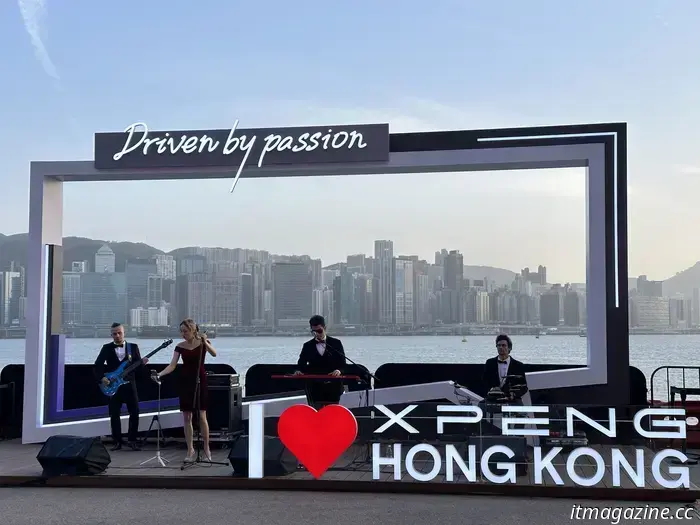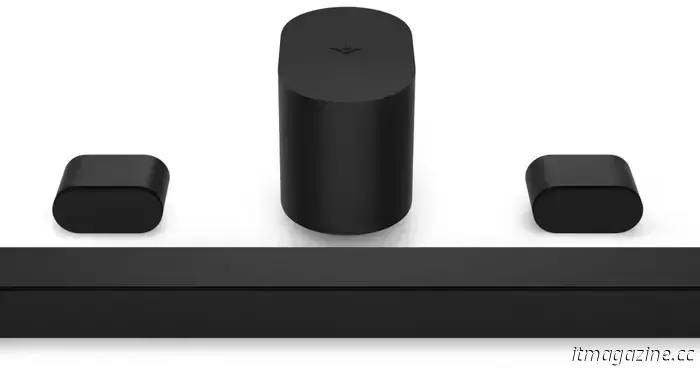
Xpeng unveils its bold global ambitions featuring the X9, an AI chip, a flying car, and a humanoid robot.
Credit: Xpeng
Chinese electric vehicle manufacturer Xpeng held its 2025 Global Brand Night in Hong Kong on Tuesday, highlighting the company's advancements in AI chips, flying cars, and humanoid robots. The Guangzhou-based firm also unveiled its first global flagship model, the Xpeng X9, a seven-seat multi-purpose vehicle. Why it matters: This event indicates Xpeng’s broader strategy to expand beyond electric vehicles. By integrating AI, energy solutions, and robotics, the company is establishing an interconnected ecosystem that includes smart vehicles, humanoid robots, and flying cars, illustrating its vision for the future of mobility.
Details: The event took place at Hong Kong’s Kai Tak Cruise Terminal, featuring an immersive stage with the stunning nighttime view of Victoria Harbour. Displays included the new X9 model, flying vehicles, and robots. During his keynote, CEO He Xiaopeng underscored Xpeng’s ambition for increased international visibility. The Xpeng X9, its inaugural global flagship model, targets the markets in Hong Kong and Europe and offers a right-hand drive variant for international customers. The launch in Hong Kong is considered a key step towards entering over 60 countries and regions by 2025. At the brand night, He Xiaopeng mentioned the goal of achieving L3-level autonomous driving capabilities in mainland China by the end of 2025.
The company announced plans for mass production of its proprietary Turing AI chip in mainland China in the second quarter of 2025. Specifically created for advanced intelligent driving, a single Turing AI chip can handle 30-billion-parameter models, providing three times the capacity of existing chips, according to Xpeng. This chip will be utilized in autonomous driving, robotics, and flying vehicles.
CEO He also revealed that the AEROHT Land Aircraft Carrier, the world’s first modular flying car, is set to begin mass production in 2026. The planned annual production capacity at the Guangzhou factory is 10,000 units, with pre-sales exceeding 4,000 units anticipated by the end of 2024.
Xpeng’s humanoid robot, IRON, is powered by the Turing AI chip and features 60 joints, 200 degrees of freedom, and 3,000 TOPS of processing power, as shown during the event. Shi Xiaoxin, head of Xpeng’s humanoid robot program, told TechNode in an interview that an upgraded version of the IRON robot will debut in the latter half of this year. This enhanced robot, demonstrating improved flexibility and mobility, will first be tested internally, including at Xpeng’s Guangzhou factory, with a full market release expected around 2027 or 2028, Shi stated.
“When examining other robots available, many prioritize eye-catching demonstrations—such as running and jumping,” said Shi regarding what sets Xpeng’s robot apart. “For us, the emphasis is on real-world application. We’re training our robot in actual factory settings to perform essential tasks. The robot industry is still nascent, facing numerous challenges, such as an immature supply chain for critical components. Consequently, we have invested resources in developing our own parts and technologies over the past two years.”
Context: According to its financial report, Xpeng sold 190,000 vehicles in 2024, marking a year-on-year increase of approximately 34%. Revenue for the previous year rose 33.2% to RMB 40.87 billion ($5.56 billion). Overseas sales reached 20,000 units, and the company aims to exceed 380,000 units in 2025.
Jessie Wu is a tech reporter based in Shanghai who covers consumer electronics, semiconductors, and the gaming industry for TechNode. You can connect with her via e-mail: [email protected].

Other articles
 Looking for a 5.1 soundbar? Today, one of Vizio's 2024 Atmos bundles is discounted by $50.
The Vizio 5.1 Soundbar with Wireless Sub (SV510X-0806) is available today at certain retailers for just $200. The original MSRP for this Dolby Atmos bundle is $250.
Looking for a 5.1 soundbar? Today, one of Vizio's 2024 Atmos bundles is discounted by $50.
The Vizio 5.1 Soundbar with Wireless Sub (SV510X-0806) is available today at certain retailers for just $200. The original MSRP for this Dolby Atmos bundle is $250.
 How Trump's tariffs may alter the future landscape for Chinese technology companies.
On Monday, January 20, President Donald Trump was officially inaugurated for his second term at the US Capitol. Present at the inauguration were various foreign dignitaries.
How Trump's tariffs may alter the future landscape for Chinese technology companies.
On Monday, January 20, President Donald Trump was officially inaugurated for his second term at the US Capitol. Present at the inauguration were various foreign dignitaries.
 NYT Mini Crossword today: answers for the puzzle dated Thursday, April 17.
The NYT Mini crossword may be significantly smaller than a standard crossword, but it's still quite challenging. If you're having trouble with today's puzzle, we have the solutions for you.
NYT Mini Crossword today: answers for the puzzle dated Thursday, April 17.
The NYT Mini crossword may be significantly smaller than a standard crossword, but it's still quite challenging. If you're having trouble with today's puzzle, we have the solutions for you.
 As AI inundates music platforms, Deezer is taking a stand — in contrast to Spotify.
Deezer has provided an update regarding its initiatives to eliminate AI-generated music, distinguishing the French platform from the streaming leader Spotify.
As AI inundates music platforms, Deezer is taking a stand — in contrast to Spotify.
Deezer has provided an update regarding its initiatives to eliminate AI-generated music, distinguishing the French platform from the streaming leader Spotify.
 NYT Strands today: clues, spangram, and solutions for Thursday, April 17.
Strands offers a challenging twist on the traditional word search from NYT Games. If you're having difficulty and can't figure out today's puzzle, we've got assistance and clues for you right here.
NYT Strands today: clues, spangram, and solutions for Thursday, April 17.
Strands offers a challenging twist on the traditional word search from NYT Games. If you're having difficulty and can't figure out today's puzzle, we've got assistance and clues for you right here.
 Tips from an expert on how to view the Lyrid meteor shower this weekend.
A specialist from the Royal Astronomical Society describes how to achieve the optimal view of the Lyrid meteor shower.
Tips from an expert on how to view the Lyrid meteor shower this weekend.
A specialist from the Royal Astronomical Society describes how to achieve the optimal view of the Lyrid meteor shower.
Xpeng unveils its bold global ambitions featuring the X9, an AI chip, a flying car, and a humanoid robot.
Chinese electric vehicle manufacturer Xpeng held the 2025 Xpeng Global Brand Night in Hong Kong on Tuesday. The event highlighted the company's advancements in AI chips, flying cars, and humanoid robots. The Guangzhou-based firm also introduced its first global flagship model, the Xpeng X9, which is a seven-seater multipurpose vehicle.
